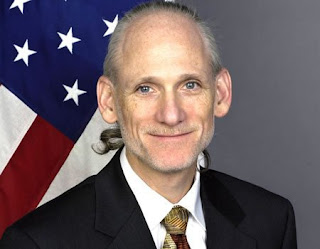United States’ Special Coordinator for Water Resources, Bureau of Oceans, Environment, and Science Affairs, Aaron A. Salzberg, recently had a teleconference with journalists across some African regions on transboundary water issues and the Water for the World Act, among other germane issues. DOYIN ADEOYE, who was among journalists gathered at the US Consulate, Victoria Island, Lagos, writes.
Although a lot of progress has been recorded in the global water challenge, today, somewhere between 1.5 and two billion people still lack access to water that is safe to drink, while more than two billion people lack access to basic sanitation.
With a high proportion of these people in Africa, particularly in poor and rural populations, this lack of safe water, sanitation and basic hygiene, remains one of the leading causes of death of children under five, and a major source of both physical and cognitive stunting which can have a major impact on development outcomes.
Salzberg, who is the first person to hold the title of Special Coordinator for Water Resources, Bureau of Oceans, Environment, and Science Affairs, noted that “Many countries throughout the world remain water insecure; they remain at risk of shortages of water, lack of water for drinking, water for food, for industrial use, or are at risk of floods and other water related natural disasters.
“Climate change, of course, is exacerbating many of these challenges and this water insecurity is becoming a growing impediment to economic growth and an increasing source of tension between communities and countries.”
However, he reaffirmed the United States’ commitment in ensuring that people have sustainable supplies of water, adding that the “United States is working globally to improve water security. This means increasing access to safe drinking water and sanitation, improving water resources management, and promoting cooperation on shared waters.”
Through capacity building, investment in infrastructure, diplomatic engagement, science and technology cooperation, and partnerships, a lot is been done to ensure that many people access the world have access to safe and clean water.
Sunday, 26 March 2017
Pangolin Day: Saving world’s most trafficked mammal
With one million pangolins estimated to have been traded illegally in the last decade, this solitary, primarily nocturnal animal is the most trafficked mammal in the world.
Also known as the scaly anteaters, there are eight species of the pangolin, with four found in Asia and the rest in Africa. While all four Asian pangolins are listed as endangered or critically endangered under the International Union for Conservation of Nature (IUCN) Red List, the four African pangolins are all listed as vulnerable under the IUCN Red List.
According to an Environmental Impact Assessment (EIA) study on all publicly available records for pangolin seizures globally, the number of documented seizure incidents within Africa had gone up from 39 in February 2016 to 113 reported seizures now, with Tanzania, Nigeria, Cameroon and Uganda emerging as key export hubs.
Trafficking in such large quantities occurring on an international scale highlights the organised nature of this illegal trade which is proving increasingly profitable to wildlife traffickers. Although with its protective scales and unusual stance, the pangolin may appear to be aggressive, it is however, vulnerable, as it rolls itself into a ball for protection when threatened, thereby making it easy for poachers to simply pick up.
The demand for pangolin scales comes mostly from China and Vietnam, where its scales are unfortunately believed to be a cure-all of sorts and its flesh is considered a delicacy.
Also known as the scaly anteaters, there are eight species of the pangolin, with four found in Asia and the rest in Africa. While all four Asian pangolins are listed as endangered or critically endangered under the International Union for Conservation of Nature (IUCN) Red List, the four African pangolins are all listed as vulnerable under the IUCN Red List.
According to an Environmental Impact Assessment (EIA) study on all publicly available records for pangolin seizures globally, the number of documented seizure incidents within Africa had gone up from 39 in February 2016 to 113 reported seizures now, with Tanzania, Nigeria, Cameroon and Uganda emerging as key export hubs.
Trafficking in such large quantities occurring on an international scale highlights the organised nature of this illegal trade which is proving increasingly profitable to wildlife traffickers. Although with its protective scales and unusual stance, the pangolin may appear to be aggressive, it is however, vulnerable, as it rolls itself into a ball for protection when threatened, thereby making it easy for poachers to simply pick up.
The demand for pangolin scales comes mostly from China and Vietnam, where its scales are unfortunately believed to be a cure-all of sorts and its flesh is considered a delicacy.
Subscribe to:
Comments (Atom)

